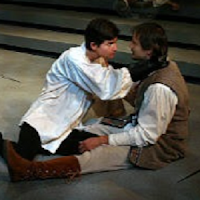 |
| Self w/Katherine Nash (Jan 2024) |
One great advantage of being a member of a writers’ group is that it creates for you a deadline. If you are on your own, you set your own timeline for creation. If you meet with colleagues – once a week, once every two weeks, once a month – you may be expected to produce a certain number of pages. And so you have a responsibility outside of yourself, you have homework.
Twenty or so years ago, my wife invited me to join her writers’ group. They met at the Case Campus Arabica (now The Coffee House at University Circle) and it was with this ensemble that I began work on what became I Hate This (a play without the baby). Sharing individual scenes from a larger work, as I was composing it, this was a new experience to me. It was a supportive ensemble and extremely rewarding.
Some years later, after this team had amicably parted ways, I tried starting a writers’ group on my own, which lasted two weeks. We had infant children and I wasn’t in the right place to be managing anything that would take up so much time outside of work. I didn’t want to run a writers’ group, you know? I wanted to be in one. I’d just ended a theater company, I still wanted to create things, I was done with running them.
By 2008, I had been invited to join the (former) Playwrights’ Unit at the Cleveland Play House, and that was when my work started to take off. We were required to bring ten pages every two weeks, and that’s when I really started writing them plays. I developed well over a dozen full length plays and several more short works before the Unit folded nine years later.
Since that time I have been a much more consistent writer, continuing to write plays on my own time. When a draft is complete, I will host a private reading to hear how it sounds and to receive comments. What I do miss, however, is receiving feedback as the work progresses.
So I have been going to the Dark Room.
The Dark Room is like an “open mic” for playwrights, to hear their work read aloud. It started about twenty years ago, a program of the (former) Cleveland Theater Collective, an organization created to foster and support collaboration between all area theaters.
Management and maintenance of the Dark Room was turned over to Mindy Childress Herman in 2007, John Busser signed on to co-manage two years later, and they have shepherded the program ever since, in various sites on the campus of Cleveland Public Theatre. It’s a free event, the second Tuesday of the month folks gather to have their work read, to read the works of others, or just to witness.
 |
| Paul Manganello (Feb 2017) |
You know that list of things you say you’ll get to, but never do? Since our youngest headed off to school, I have found myself actually doing those things. And one of those things is the Dark Room.
There’s this thing I’ve been working on, I won’t go too far into it, it’s inspired by a lot of recent discoveries I’ve made, about my family, about my life. I got an idea for a structure, a family story told in reverse chronology. So I’ve been bringing pieces to the Dark Room since November, to read them in actual chronological order, to hear how folks respond to them, and the response has been pretty positive.
Better than that, however, has been listening to the other works. It's a good time! And the community, this Cleveland theater community, folks I see sporadically — or every fucking day on Facebook but that’s not the same, you know? I’ve grown accustomed to, or made myself accustomed to the familial solitude mandated by the quarantine, and I’ve always had a degree of social anxiety, anyway.
But sweet are the uses of community. I am glad for such company.
Special thanks to Mindy and John for their contributions to this post.








